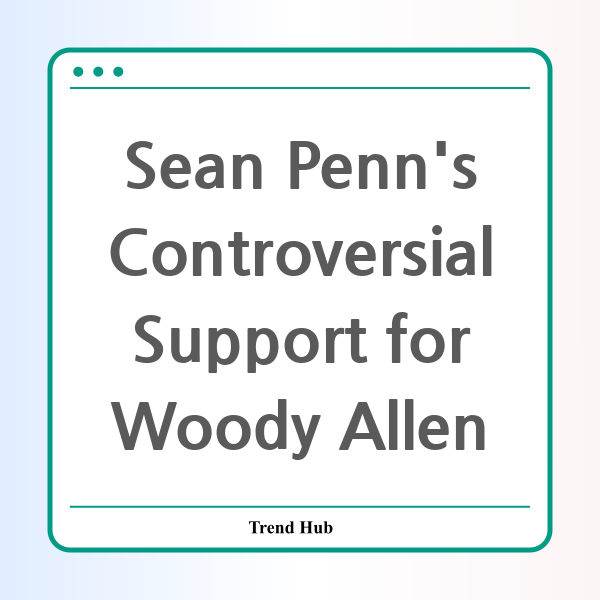* This website participates in the Amazon Affiliate Program and earns from qualifying purchases.

In a recent podcast appearance, Sean Penn sparked a wave of discussion by expressing his willingness to work with acclaimed director Woody Allen again, despite the serious allegations of child sexual abuse that have surrounded Allen for decades. Penn stated, "I’d work with him in a heartbeat if it was the right thing," echoing sentiments that have led to a complex dialogue about accountability and guilt in Hollywood.
This declaration comes from a place where Penn grapples with the implications of the allegations against Allen, particularly those made by his adopted daughter, Dylan Farrow. While acknowledging the sensitive nature of the topic, Penn defended Allen, saying, "I don’t know anyone well enough to say 100% this didn’t happen or that didn’t happen." His remarks highlight the difficulty in navigating the often murky waters of public accusations and legal guilt.
Penn’s comments raise critical questions about the legal and moral responsibilities of artists in the face of allegations. In the podcast, he articulated a perspective that emphasizes the necessity of due process: "I see he is not proven guilty, so I take him as innocent." This stance has ignited discussions about the broader implications of the #MeToo movement and the societal shifts it has prompted regarding how allegations are treated in public discourse.
For many, Penn's comments may provoke a feeling of discomfort, particularly as they reflect a tension between artistic freedom and the responsibility that comes with the consequences of one's actions. The film industry has long grappled with its figures who have faced serious allegations, and this latest revelation from Penn underscores the complexities involved.
Critics may point out that Penn's readiness to champion Allen could be seen as dismissive of the gravity of the accusations. During the discussion, Penn cautiously navigates the topic, admitting, "God forbid you’re wrong and there is a victim involved, right?" This acknowledgment, however, seems to take a backseat to his desire to advocate for Allen’s presumed innocence until proven otherwise.
Penn also elaborated on a troubling observation regarding the nature of accusations, stating, "I am not aware of any clinical psychologist or psychiatrist or anyone I ever heard talk about the subject of pedophilia that in 80 years of life it only happens once. I am not aware of that." This viewpoint taps into a larger conversation about the psychology of abuse and the societal structures that allow it to persist, while also addressing the skepticism that often accompanies allegations against wealthy and powerful individuals.
As public discussions continue to evolve, this incident serves as a reminder that the conversations about sexual misconduct and accountability are far from straightforward. With increasingly polarized views on figures like Allen and the broader cultural implications of their work, the lines between art and artist become blurred, leaving audiences grappling with difficult ethical considerations.
In conclusion, Sean Penn’s willingness to work with Woody Allen again reveals the complexities of interpreting guilt in an era where allegations can be both public and deeply personal. It also invites us to reflect on how we respond to accusations in the public sphere and what it means for the future of artistic collaboration amid controversy. Whether audiences will ultimately embrace or reject Penn's perspective remains to be seen, but the discussion it has ignited is sure to continue shaping the narrative around artistic integrity and accountability.
* This website participates in the Amazon Affiliate Program and earns from qualifying purchases.